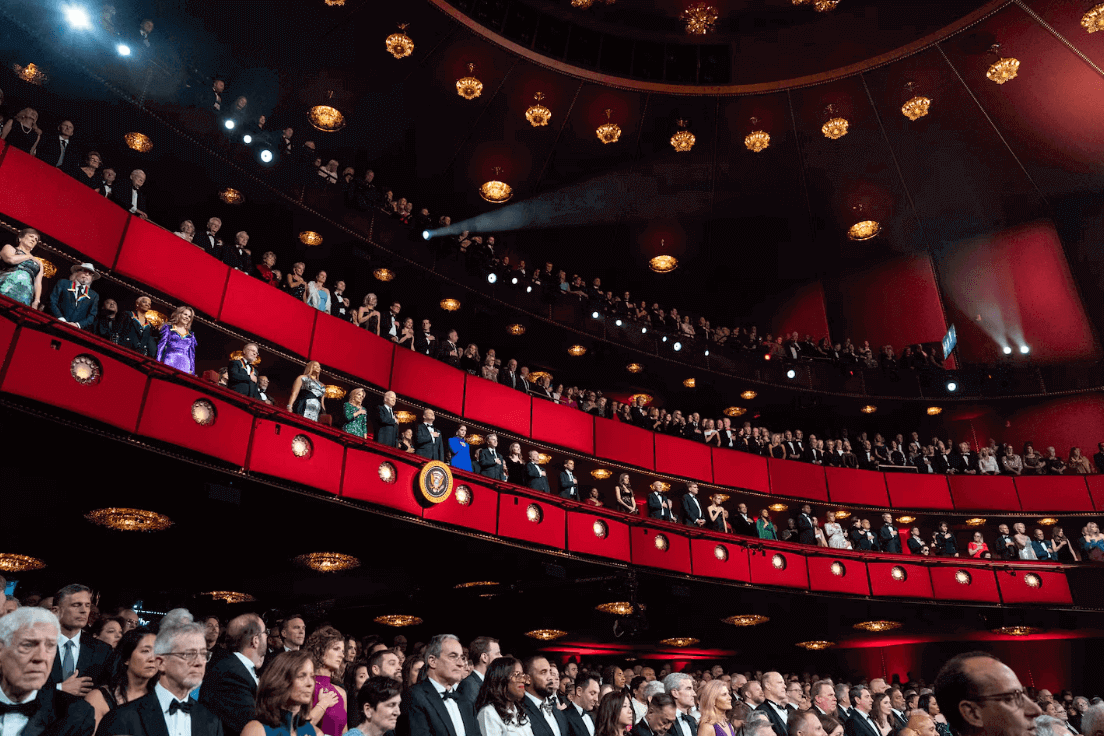特朗普正在重塑联邦政府与艺术的关系——马萨诸塞州的艺术家已经感受到了影响

【中美创新时报2025 年 2 月 15 日编译讯】(记者温友平编译)特朗普总统在改组投票委员会以纳入更多政治盟友并承诺结束该中心的“觉醒”节目后,一致当选为肯尼迪中心新任主席。随后出现了一波辞职和取消活动的浪潮。“这是典型的独裁剧本,”一位当地音乐家说,而博赫中心前首席执行官乔·斯波尔丁称特朗普收购肯尼迪中心是“一个错误”。对此,《波士顿环球报》记者朱利安·E·J·索拉普鲁作了下述报道。
几个月前,北安普顿的儿童读物作家兼插画家 Grace Lin 签订了合同,将她的两本书《中国菜单》和《小雪的大床》改编成约翰·肯尼迪表演艺术中心的戏剧。她说,这是“梦想成真”。
随后周三有消息称,特朗普总统在改组投票委员会以纳入更多政治盟友并承诺结束该中心的“觉醒”节目后,一致当选为肯尼迪中心新任主席。随后出现了一波辞职和取消活动的浪潮。
现在,林的梦想陷入了困境。“我只是不认为一本以亚裔美国人为主角的书会是(肯尼迪中心)会热衷的事情,”倡导儿童文学多样性和包容性的林周四晚上在电话中说。“怀疑这可能不会发生对我来说真的很伤心,但我确实知道世界上还有更大、更糟糕的问题。”
与此同时,她补充道,“通过艺术,我们一直能够说出我们不能说、不会说或不被允许说的话。……这就是艺术如此重要的原因。”
在特朗普政府做出一系列文化决定后,林是众多感到失落的马萨诸塞州艺术家之一。除了肯尼迪中心被接管之外,这些决定还包括史密森尼博物馆取消多元化办公室、总统艺术与人文委员会解散、行政命令要求政府建筑采用“传统和古典”建筑风格、从国家公园管理局的石墙国家纪念碑网站上删除“跨性别”和“酷儿”字样。
上周,美国国家艺术基金会宣布改变其资助重点和指导方针,以配合联邦政府终止多元化、公平和包容性举措。美国国家艺术基金会表示,将取消 2026 年“挑战美国”拨款,该拨款几十年来一直向服务不足社区的小型艺术组织发放款项。
在 2025 年获得 10,000 美元拨款的数百个组织中,有六个位于马萨诸塞州:表演艺术学校波士顿城市之光;阿克顿探索博物馆;布罗克顿的富勒工艺博物馆;波士顿的非裔拉丁裔创意青年发展非营利组织海德广场工作组;东汉普顿一家致力于艺术平等的非营利组织弹性社区艺术;以及剑桥的室内乐团萨拉萨。
“这是典型的独裁主义策略,”萨拉萨的总监兼创始人蒂莫西·默顿说。该组织计划利用这笔赠款资助其音乐解锁计划,为马萨诸塞州东部被监禁的青少年提供一个创意出口。
“信息是,任何有色人种或穷人的文化在这个新时代都不算数,”默顿说。
在 2 月 6 日的新闻稿中,国家教育协会表示,它正在从挑战美国转移资源,以便将该机构的努力集中在“庆祝和纪念《独立宣言》签署 250 周年”的项目上。
波士顿城市之光财务主管 Tiane Donahue 批评该决定“与许多团体通过艺术开展的实地工作毫无关系”。Donahue 称,像波士顿城市之光夏季计划这样的项目将不再被国家艺术基金会优先考虑,这“令人沮丧和失望”,该计划主要将低收入青少年从波士顿带到缅因州参加表演艺术密集课程。
联邦艺术机构还宣布,只有拥有五年艺术项目历史的申请者才有资格获得资助。这一规定引发了人们对新艺术组织在没有 NEA 资助资格的情况下如何找到财务基础的担忧。
“如果我们倒退几年,我们甚至没有资格,”她于 2021 年创立的 Resilient Community Arts 总监 Maddie McDougall 说。McDougall 说,该组织从 NEA 获得的 10,000 美元资助是“我们获得的最大一笔资金”,用于她的组织在斯普林菲尔德的南公理会教堂提供的视觉艺术项目,该教堂为附近的米尔顿布拉德利学校的学生提供服务。
富勒工艺博物馆开发总监 Kara Matthews 预计联邦政府将进一步削减与艺术相关的支出。她说,这将迫使许多艺术组织更加依赖慈善事业来生存,这“可能很难让资助者承受”。
尽管如此,“我们不会以任何方式改变我们的展览,以更适应 NEA 的重点,”马修斯说。博物馆利用其“挑战美国”拨款资金帮助支付剑桥画家、版画师和公共艺术家西塞莉·卡鲁 (Cicely Carew) 最近的装置作品。
博赫中心前首席执行官乔·斯波尔丁 (Joe Spaulding) 表示,将联邦艺术组织政治化是“一个错误”。
斯波尔丁在博赫中心任职 38 年后于 2024 年退休,他特别谈到了肯尼迪中心的接管。“让我担心的是,曾经两党合作的董事会不再是两党合作的——而且董事会将决定舞台上的内容,”他说。
“艺术不应该是那样。艺术和音乐是文明社会的基础,公众应该决定他们想看什么。”
题图:2023 年 12 月 3 日,在华盛顿约翰·肯尼迪表演艺术中心举行的第 46 届肯尼迪中心荣誉奖颁奖典礼上,观众鼓掌。蒋海云/纽约时报
附原英文报道:
Trump is reshaping the federal government’s relationship to the arts — and Massachusetts artists are already feeling the effects
‘It’s the typical authoritarian playbook,’ says one local musician, while Joe Spaulding, former CEO of the Boch Center, calls Trump’s Kennedy Center takeover ‘a mistake’
By Julian E.J. Sorapuru Globe Staff,Updated February 15, 2025
The audience applauded during the 46th Kennedy Center Honors at the John F. Kennedy Center for the Performing Arts in Washington on Dec. 3, 2023.HAIYUN JIANG/NYT
A few months ago, Northampton-based children’s book author and illustrator Grace Lin signed contracts to adapt two of her books, “Chinese Menu” and “A Big Bed for Little Snow,” into plays at the John F. Kennedy Center for the Performing Arts. It was “a dream come true,” she said.
Then came Wednesday’s news that President Trump had been unanimously elected as the new chairman of the Kennedy Center after remaking the voting board to include more of his political allies and pledging to end “woke” programming at the center. A wave of resignations and cancellations followed.
Now, Lin’s dream is in limbo. “I just don’t foresee a book with an Asian American main character being something [the Kennedy Center] would be enthusiastic about,” Lin, an advocate for diversity and inclusion in children’s literature, said when reached by phone Thursday evening. “To suspect that it’s probably not going to happen is just really sad for me, but I do understand there are much bigger and worse problems in the world.”
At the same time, she added, “It’s through art that we’ve always been able to say the things we either couldn’t say, or wouldn’t say, or weren’t allowed to say. … That is why art is so important.”
Lin is one of many Massachusetts artists feeling a sense of loss following a raft of cultural decisions made by the Trump administration. In addition to the Kennedy Center takeover, they range from the Smithsonian axing its diversity office to the dissolution of the President’s Committee on the Arts and Humanities to an executive order calling for “traditional, and classical” architecture for government buildings to erasing the words “transgender” and “queer” from a National Park Service website for the Stonewall National Monument.
Last week, the National Endowment for the Arts announced changes to its funding priorities and guidelines in alignment with the federal government’s termination of diversity, equity, and inclusion initiatives. The NEA said it was scrapping the 2026 Challenge America grant, which, for decades, has issued payments to small arts organizations reaching underserved communities.
Among the hundreds of organizations that received the $10,000 grant in 2025, six were Massachusetts-based: performing arts school Boston City Lights; the Discovery Museum of Acton; Fuller Craft Museum in Brockton; Hyde Square Task Force, an Afro-Latin creative youth development nonprofit in Boston; Resilient Community Arts, an Easthampton nonprofit focused on equity in the arts; and the chamber music ensemble Sarasa of Cambridge.
“It’s the typical authoritarian playbook,” said Timothy Merton, director and founder of Sarasa. The group plans to use the grant money to fund its Music Unlocked program that provides incarcerated teens in Eastern Massachusetts with a creative outlet.
“The message is that the culture of any people of color, or poor people, they don’t really count in this new era,” Merton said.
In a Feb. 6 press release, the NEA said it was diverting resources from Challenge America in order to focus the agency’s efforts on projects that “celebrate and honor the 250th anniversary of the signing of the Declaration of Independence.”
Tiane Donahue, treasurer of Boston City Lights, criticized the decision for having “nothing to do with the on-the-ground work that a lot of groups are doing” through the arts. Donahue called it “disheartening and disappointing” that programming like the Boston City Lights summer program, which takes predominately low-income teens from Boston to Maine for a performing arts intensive, will no longer be prioritized by the NEA.
The federal arts agency also announced that only applicants with a five-year history of arts programming will be eligible for grants moving forward. The stipulation has raised concerns about how newer arts organizations will find their financial footing without NEA grant eligibility.
“If we were to rewind a few years, we wouldn’t even be eligible,” said Maddie McDougall, director of Resilient Community Arts, which she founded in 2021. McDougall said the group’s $10,000 NEA grant was “the largest funding amount we had ever gotten” for the visual arts programming her organization provides at South Congregational Church in Springfield, which serves students from the nearby Milton Bradley School.
Fuller Craft Museum director of development Kara Matthews is anticipating more arts-related federal spending cuts. She said they would force many arts organizations to be more reliant on philanthropy to survive, which “could be hard for funders to absorb.”
Still, “we’re not in any way changing our exhibitions to be more accommodating to NEA’s focus,” Matthews said. The museum used its Challenge America grant funds to help pay for a recent installation by Cambridge-based painter, printmaker, and public artist Cicely Carew.
Joe Spaulding, former chief executive of the Boch Center, said politicizing federal arts organizations is “a mistake.”
Spaulding, who retired in 2024 after 38 years at the helm of the Boch, spoke pointedly about the Kennedy Center takeover, in particular. “What worries me is that the board that was bipartisan is no longer bipartisan — and that board is going to dictate what’s on stage,” he said.
“The arts should never be that way. Arts and music are the foundation of a civilized society, and the public should decide what they want to see.”

